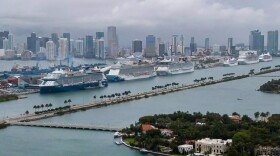-
In lush South Florida, trees and bushes grow all year round. And that means yard waste and dead trees never stop piling up. But leaving them in a landfill is a climate-warming issue.
-
Here’s how Florida lawmakers want to change the state’s environmental laws this year.
-
A proposal included in the county's $12.9 billion budget would strip the Division of Environmental Resources Management of its permitting authority even as it re-establishes DERM as an independent department.
-
Florida boasts at least 1,000 freshwater springs, more than any other U.S. state. They are all under threats from agricultural pollution, stress from rapid development and from climate change that is altering rainfall patterns and causing sea level rise. Some places, such as the town of Zephyrhills in west-central Florida, have imposed moratoriums on specific kinds of new construction just to slow things down.
-
With record-breaking heat and stronger hurricanes, Florida is considered ground zero by some for global warming consequences.
-
Environmental groups and the state have reached a settlement to end a federal lawsuit over management of the Piney Point site that leaked millions of gallons of wastewater into Tampa Bay in 2021.
-
FIU researchers are experimenting with "floating wetlands" to improve the water quality of Miami's canals.
-
University of Florida scientist Tracie Baker, canoed the same extremely remote 130-mile path that explorer Hugh Willoughby traveled 125 years ago — with the goal of comparing water in 2022 with 1897 and assessing the intrusion of modern chemicals into some of the most remote wilderness in America.
-
The Florida Department of Transportation turned down $320 million dollars in federal funding to reduce carbon emissions, saying they refused to support “the politicization of Florida’s roadways.”
-
Palm Beach County ranked 4th in the nation for fine particulate pollutants, Broward and Miami-Dade counties were in the top 15, and Hillsborough was 25th.
-
PFAS, which leak from failing septic systems and wash off airport runways, can end up in streams that ultimately discharge into ocean ecosystems where marine animals live.
-
Starting Jan. 1, people will not be allowed to smoke cigarettes and other tobacco products on public beaches to reduce pollution. Here is what you need to know.
Play Live Radio
Next Up:
0:00
0:00
Available On Air Stations












